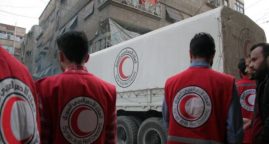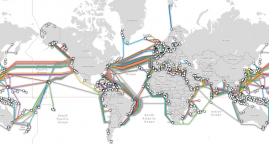Child safety summit reflects Pope’s ‘extraordinary’ power to convene
Article published on Cruxnow website on 10/04/2017 by John L. Allen Jr.
Look around at the lineup at an Oct. 3-6 summit at Rome’s Gregorian University on “Child Dignity in the Digital World,” and it’s a host of experts from the biggest outfits in their various fields — Harvard, Interpol, Facebook, UNICEF, Microsoft, and so on. It’s the cream of the crop, and it’s another illustration of the Vatican’s unique power to convene, since basically nobody can say no to an invite from the pope.
Ever since the collapse of the Papal States in 1870, the Vatican has had to make its way in the world as a “soft power,” relying on moral authority and the pope’s massive bully pulpit to move the ball on matters it perceives as priorities. That soft power takes many forms, but one is on especially clear display this week at Rome’s Jesuit-sponsored Gregorian University: The power to convene.
One of the near-universal truths about the Vatican’s role in the world today is that virtually nobody can say no to an invitation from the pope. You can put together almost any sort of event you want, from a study of artificial intelligence to a symposium on punk rock in the 1980s, and if it comes with the promise of face time with the pope at some point, the world’s leading authorities on the subject inevitably will show up.
That’s not the only reason they come, of course – they come because they’re passionate about the subject, because Rome is not the worst place to spend a few days, and because they’ll see valued friends and colleagues who plow the same furrows. Still, however, it’s fair to say that the magnetic attraction of the pope doesn’t hurt.
Oct. 3-6, the Gregorian is hosting a major international summit titled “Child Dignity in the Digital World,” devoted to the effort to combat child abuse and exploitation online, especially the so-called “Dark Web.” It’s a vast region of the internet, perhaps the overwhelming majority, which is anonymous and designed to be impossible to detect, where 80 percent of the traffic is believed to be driven by child pornography.
The participants represent the best of the best across a staggering range of fields: An epidemiologist from Harvard, the Director of Police Services from Interpol, the Head of Global Safety Policy at Facebook, a former Chairman of an African Union commission on child safety, the Global Chief of Child Protection at UNICEF, and the Chief Online Safety Officer for Microsoft.
That’s all in addition to a baker’s dozen of academics and researchers, people who’ve been working on child abuse both at a statistical and quantitative level and also in the trenches, working with victims and survivors one-on-one.
In other words, for one week, the world’s leading minds and actors in the area of online child protection are gathered at the Gregorian, under the aegis of the Church, the Vatican and the pope, to figure out a broader and more comprehensive strategy for combating rapidly changing and evolving forms of abuse.
Participants themselves seemed a little dazzled by the brain trust assembled this week, with Dr. Elizabeth L. Letourneau of John Hopkins University on Monday paying tribute to the “extraordinary power to convene” the event reflects.
At least two things are striking about that.
First, how an institution chooses to deploy its power, whether hard or soft, makes an important statement about its priorities. Perhaps everybody would say yes to an invite from the pope, but the pope can’t actually invite everybody – they have to pick and choose, depending on perceived degrees of urgency and importance.
In this case, the Gregorian in the first instance, and the Vatican in the second, is trying to say that child protection matters, and that of all the worthy causes in the world, this is one to which they’re willing to devote real time and treasure.
Cynics may say that’s in part a cosmetic exercise, designed to draw attention away from the Church’s own clerical sexual abuse scandals. That’s a fairly silly charge in this case, for a couple of reasons.
First, the people who put this event together – such as German Father Hans Zollner, who heads the Centre for Child Protection at the Gregorian and is the coordinator of the conference, and American Monsignor Stephen Rossetti, a longtime leader in anti-abuse efforts who’s on the conference’s scientific committee – are precisely the people in the Catholic Church who have spent the better part of the last couple of decades, often at significant personal expense, trying to draw attention towards the abuse scandals, not away from them.
Second, if you’re trying to get the world to forget you’ve had a problem with child abuse, then throwing a high-profile summit with the planet’s best voices on the subject, and inviting (even begging) global media to cover it, doesn’t come off as exactly the best-thought-out obfuscation strategy I’ve ever heard of.
As a footnote to that observation, it’s worth saying that this event is unfolding under something of a cloud, since it’s a session about online child abuse at a moment when the Vatican is facing its own child pornography scandal involving a papal diplomat recalled from Washington after being flagged as a possible suspect by American authorities, for whom an arrest warrant has subsequently been issued in Canada.
Nobody here is ducking that coincidence – Rossetti, for instance, told Crux on Wednesday that he thinks the Vatican needs to be more forthcoming in what it’s telling the world about how the case is being handled. Rossetti said he believes they’ll do the right thing in the end, but somebody needs to step up and say so.
What’s striking, however, is that it’s really only Church people here discussing it. None of the other participants mentioned it during the workshops on Wednesday morning, and there didn’t seem to be much buzz about it in the hallways.
Instead, the focus seems to be on general impressions that the conference is the tip of the iceberg in terms of the contribution the Catholic Church could make, not as part of the problem but as key to the solution.
In other words, sometimes the power to convene isn’t just about putting an impressive group of VIPs on display, as a show of the pope’s capacity to bring people together. It’s also about shaking up the usual conversations, which can open up unexpected new horizons for doing something positive beyond lamenting what’s gone wrong.
Related Articles
On world day against human trafficking the Order of Malta calls for increasing joint efforts
07/27/2018. The Sovereign Order of Malta appeals to take measures to prevent and end human trafficking, while protecting and assisting victims and survivors.
Russia scores victory for ally Syria in UN vote cutting aid
01/11/2020. Russia scored a victory for its close ally Syria, using its veto threat to force the U.N. Security Council to adopt a resolution significantly reducing the delivery of cross-border humanitarian aid to over one million Syrians in the northeast.
The impact of (big) data on geopolitics, negotiations, and the diplomatic modus operandi
05/09/2017? Today, as The Economist argued, data is the new oil. It is at the core of modern developments, and is increasingly shaping political and economic lives.





